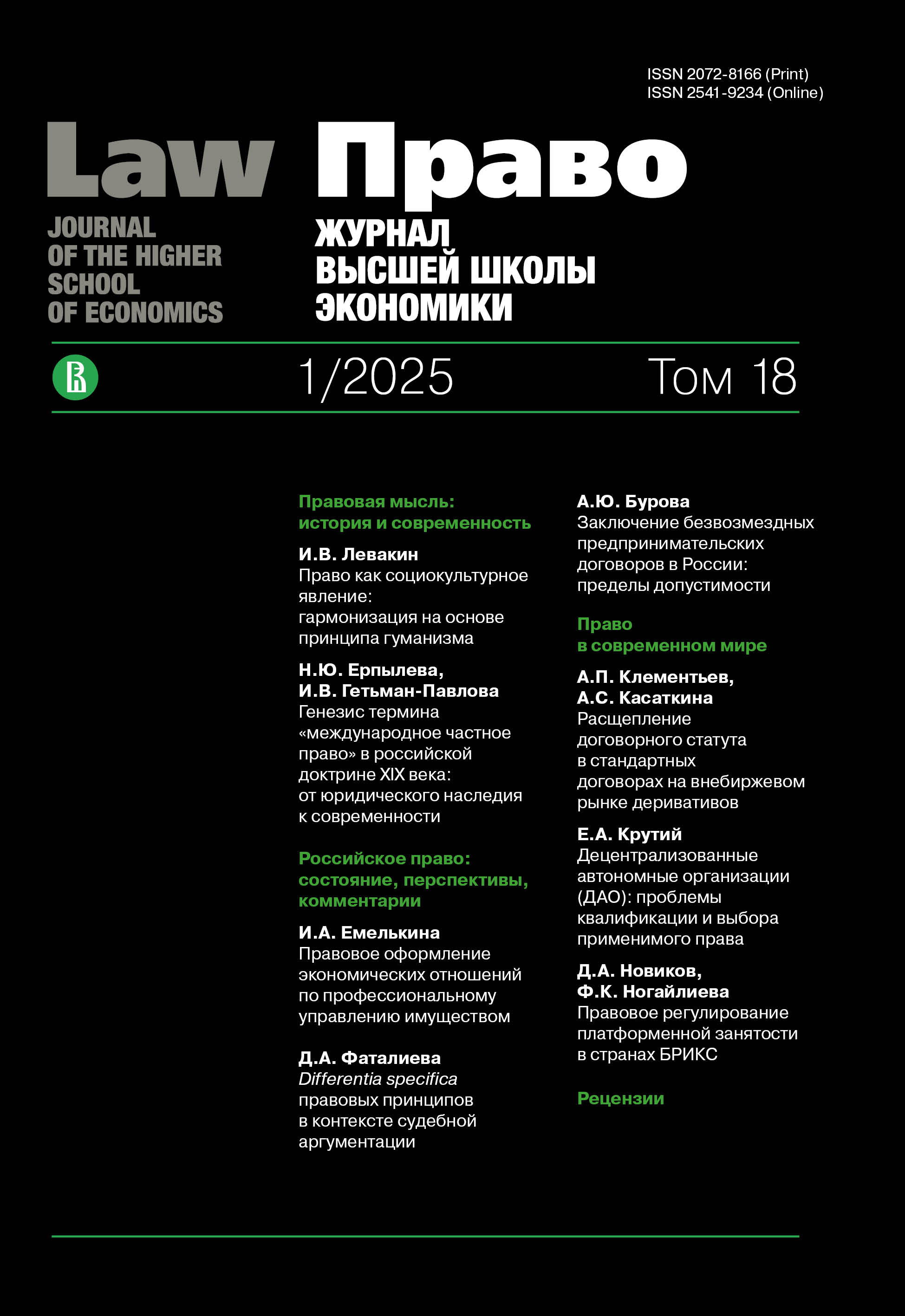Право как социокультурное явление: гармонизация на основе принципа гуманизма
Аннотация
Социокультурный подход, синтезирующий правовые и культурологические знания на основе современного прочтения принципа гуманизма, актуализирует проблему гармонизации определяющих характеристик права, сформировавшихся в различные исторические периоды развития обществ/цивилизаций. Рассмотрение права с точки зрения единства социальности и культуры, созданных и преобразуемых общественной практикой, позволяет выявить, сблизить и согласовать представления разнообразных сообществ о праве и человеке, способствовать межцивилизационному диалогу. Целью данной работы является интерпретация (истолкование, разъяснение) права в качестве социокультурного явления для поиска взаимоприемлемой основы гармонизации его характеристик, обусловленных спецификой жизни разнообразных социумов, с вариативностью присущих им идей, ценностей, норм и институтов. Приближение к данной цели осуществляется за счет последовательного решения задач по выявлению главных социокультурных особенностей, смыслов, традиций права, сложившихся в практике условных доиндустриальных, индустриальных и постиндустриальных сообществ: цивилизационный подход сочетается с универсальной типологией, главным образом учитывающей особенности экономического развития. В качестве основного методологического подхода использована генерализация (от лат. generalis — «общий, главный») — метод выделения однородных характеристик права, присущего тому или иному типу сообщества. Для обнаружения взаимоприемлемой основы гармонизации характеристик права доиндустриальных, индустриальных и постиндустриальных сообществ применен метод социокультурного анализа, учитывающий исследовательские принципы исторического и логического, позволяющий рассматривать право в качестве элемента соответствующей социокультурной среды. В результате исследования подтверждено, что современные международные акты, либеральные конституции и национальное законодательство не в должной мере решают проблемы столкновения социокультурных образований («цивилизаций»). Сделан вывод о том, что недостатки современного права во многом обусловлены непоследовательностью правоприменения в отстаивании гуманистических ценностей, их подменой политическими и/или экономическими интересами. Гармонизация конфликтных характеристик права разнообразных социумов на основе выработки и реализации общепризнанных норм не может обеспечиваться исключительно благими пожеланиями деклараций, необходимо императивно-принудительное исполнение требования уважения «жизни, свободы и личной неприкосновенности» каждого человека.
Литература
Bell D. (2004) The coming postindustrial society. Experience in social forecasting. Moscow: Academia, 944 p. (in Russ.)
Berman G. (1998) Western tradition of law: era of formation. Moscow: Norma, 624 p. (in Russ.)
Cardoso B. (2017) The nature of judicial activity. Moscow: Statut, 112 p. (in Russ.)
Ehrlich O. (2011) Basics of sociology of law. Saint Petersburg: Consortium, 704 p. (in Russ.)
Huntington S. (2003) Clash of civilizations. Moscow: AST, 603 p. (in Russ.)
Kalman L. (2016) Legal realism at Yale, 1927-1960. Chapel Hill: University of North Carolina Press, 326 p.
Khabrieva T.Ya. (2009) Legal dimension of scientific progress. Zhurnal rossiyskogo prava=Journal of Russian Law, no. 8, pp. 14-24 (in Russ.)
Lapaeva V.V. (2012) Types of legal understanding: theory and practice. Moscow: Russian Academy of Justice, 578 p. (in Russ.)
Maltsev G.V. (2012) Revenge and retribution in ancient law. Moscow: Norma, 735 p. (in Russ.)
Maltsev G.V. (2016) Cultural traditions of law. Moscow: Norma, 608 p. (in Russ.)
Marx K. (1968) Production, consumption, distribution, exchange (circulation). In: Marx K., Engels F. Works. Vol. 46. Moscow: Politizdat, pp. 28-36 (in Russ.)
Montesquieu S. (1955) On the spirit of laws. Moscow: Politizdat, 803 p. (in Russ.)
Nebratenko G.G. (2010) Doctrine of family of traditional (customary) law: state and prospects for modernization. Filosophia prava=Philosophy of Law, no. 5, pp. 10-14 (in Russ.)
Pashentsev D.A. (2020) Law enforcement in the conditions of digitalization of public relations. Vestnik Sankt-Peterbutgskogo Universiteta. Pravo=Bulletin of Saint Petersburg University. Law, no. 1, pp. 35-49 (in Russ.) DOI: https://doi.org/10.21638/spbu14.2020.103
Pavlov V.I. (2011) From classical to non-classical legal discourse. Essays on theory and philosophy of law. Minsk: Academy of Internal, 319 p. (in Russ.)
Ritser J. (2011) McDonaldization of society. Moscow: Praxis, 592 p. (in Russ.)
Rozanov V.V. (1997) Collected works. When the authorities have left. Moscow: Respublika, 671 p. (in Russ.)
Schumpeter J.A. (2008) Theory of economic development. Capitalism, socialism and democracy. Moscow: Eksmo, 864 p. (in Russ.)
Skakun O.F. (2008) General comparative jurisprudence: main types (families) of world legal systems. Kiev: In Yure Press, 460 p. (in Russ.)
Skinner K. (2023) Motives, intentions and the interpretation of texts. In: Cambridge School. Theory and Practice of Intellectual History. Moscow: New Literary Review, pp. 123-142 (in Russ.)
Syukiyainen L.R. (2021) Islamic law and dialog of cultures in the modern world. Moscow: HSE, 684 p. (in Russ.)
Tylor E. (1882) Anthropology (introduction to the study of man and civilization). Saint Petersburg: Bilibin, 437 p. (in Russ.)
Tolstykh V.L. (2023) Buddhism and international law. Rossiyskiy juridicheskiy zhurnal=Russian Law Journal, no. 5, pp. 7-26 (in Russ.)
Troshchinsky P.V. (2022) In China the court is territory of revenge. To threaten by court means actually to declare war. Zakon=Law, no. 5, pp. 8-15 (in Russ.)
Usovskaya E.A. (2006) Postmodernism. Minsk: Tetrasystems, 252 p. (in Russ.)
Wagner P. (2019) Max Weber and modernity of the XXI century. Sociological Review, no. 4, pp. 212-230. DOI: https://doi.org/10.17323/1728-192x-2019-4-212-230
Weber M. (2017) Protestant ethics and spirit of capitalism. Moscow: Center for Humanitarian Initiatives, 656 p. (in Russ.)
Zorkin V.D. (2016) Civilization of law and development of Russia. Moscow: Norma, 416 p. (in Russ.)
Copyright (c) 2025 Левакин И.В.

Это произведение доступно по лицензии Creative Commons «Attribution-ShareAlike» («Атрибуция — На тех же условиях») 4.0 Всемирная.


















